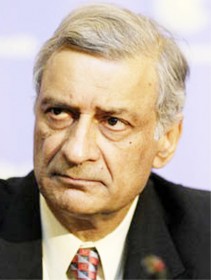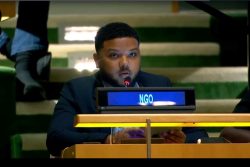–Commonwealth Secretary General
Commonwealth Secretary General Kamalesh Sharma says the Doha Development Round of trade talks has been disappointing because it is not very clear what the negotiations have offered to small and vulnerable states, and he called yesterday for the talks when renewed to spell out effectively what is there potentially for the developing world.

“…it is hard to take a very positive view of what this round is going to mean”, the Secretary General told Stabroek News in an interview yesterday. Sharma is here on a four-day official visit. He is expected to hold discussions with the Government of Guyana and attend the Caribbean Community (CARICOM) summit that opens today in Georgetown.
The Secretary General noted specifically that global talks like the Doha Round can only be successful if they meet the criteria of legitimacy, representativeness, balance, fair-mindedness, transparency , effectiveness and equal returns. It is based on these criteria that he has concluded that the Doha Round has been a disappointment.
“It is not very clear what it is bringing to the smaller states of the world because the understanding was that it would have a very clear developmental dimension which is to say that it will recognize that trade has to have a development benefit with respect to the way it is done and the way the capacity is created for trading among all its members”, Sharma stated.
On a renewal of the talks, Sharma said, it is important that the agreements reached demonstrate the developmental dimension, particularly as it relates to small and vulnerable states.
Thematically, he noted that agriculture is very important to the current round of negotiations, adding that there is scope for countries in the developing world to benefit. He recalled that the previous Uruguay Round had opened up new markets for textiles by removing restrictions which were imposed on the industry. This, he noted was an important opening for countries in the developing world.
He underscored that if there are reductions on domestic support subsidies and export support in the areas of agriculture many countries in the developing world will find that “they have a huge renewed potential opening “.
The Commonwealth Secretary General noted that countries in the Commonwealth have close to eighty percent of arable land. He said that is because the agricultural community has not developed fully and or partly because it has not been linked to the global economy in terms of what it can offer. He added that the land can become an asset countries can use for the creation of national revenue.
He made the point that countries cannot survive on handouts saying growth has to be organic. According to him, no country has been assisted out of poverty; instead they grow out of poverty.
Further, he emphasized that it is very important for trading agreements established whether within the context of the global talks and or between developing countries and emerging powers not to be adverse to the prospects of smaller states. He said too that there is a responsibility on emerging economies to be drivers of growth and increase possibilities for the rest of the world, particularly developing states.
The Doha Development Round is aimed at freeing global trade and at extending the benefits of globalisation to developing countries, but it yet to come to a successful conclusion.
As of 2008, talks have stalled over a divide on major issues, such as agriculture, industrial tariffs and non-tariff barriers, services, and trade remedies. Among the most reported significant differences are those between developed nations led by the European Union, the United States and Japan and the major developing countries led and represented mainly by India, Brazil, China and South Africa.
Sharma, an Indian diplomat assumed the post of Commonwealth Secretary-General on on 1 April 2008. He was appointed to the post by Commonwealth Heads of Government at their meeting in Kampala, Uganda, in November 2007.







